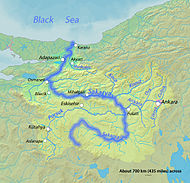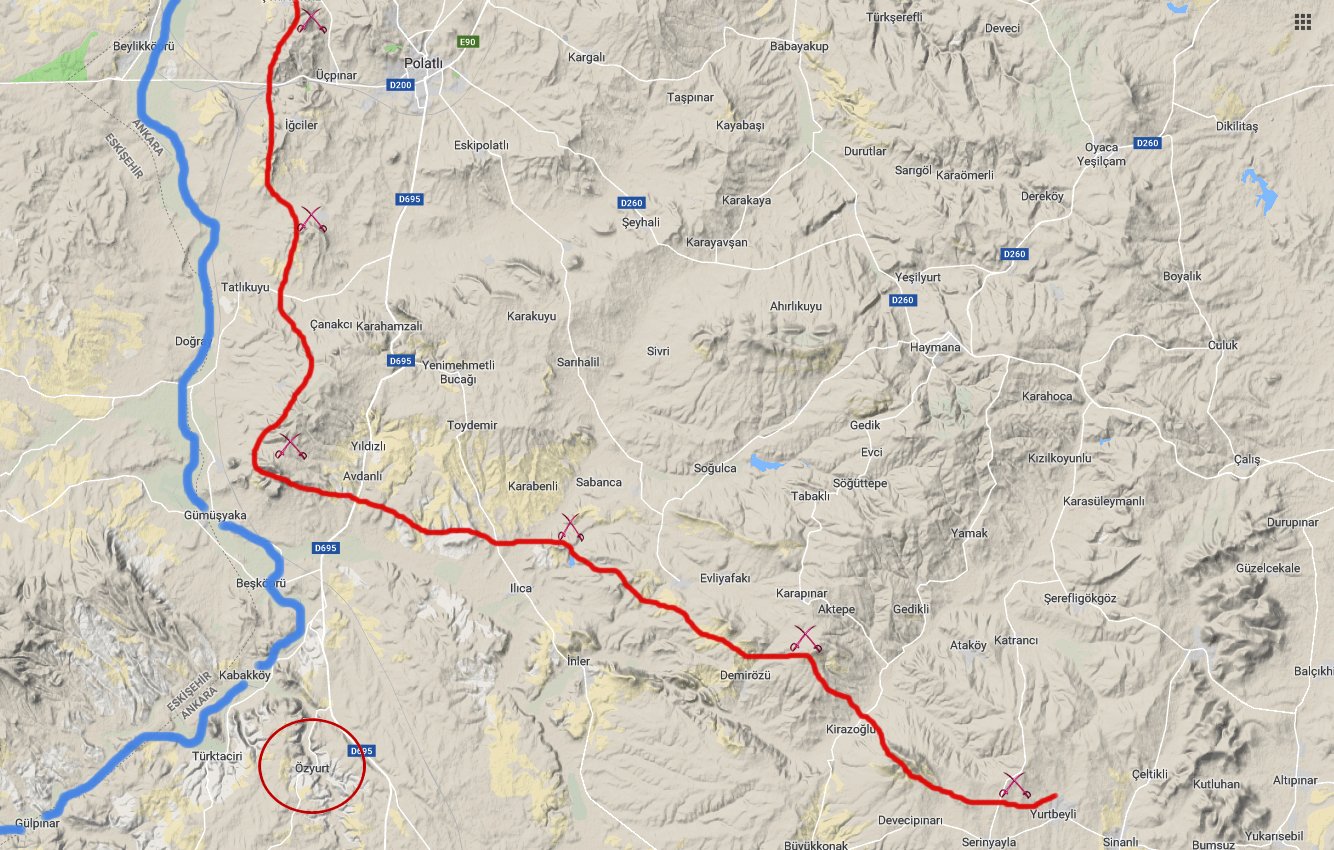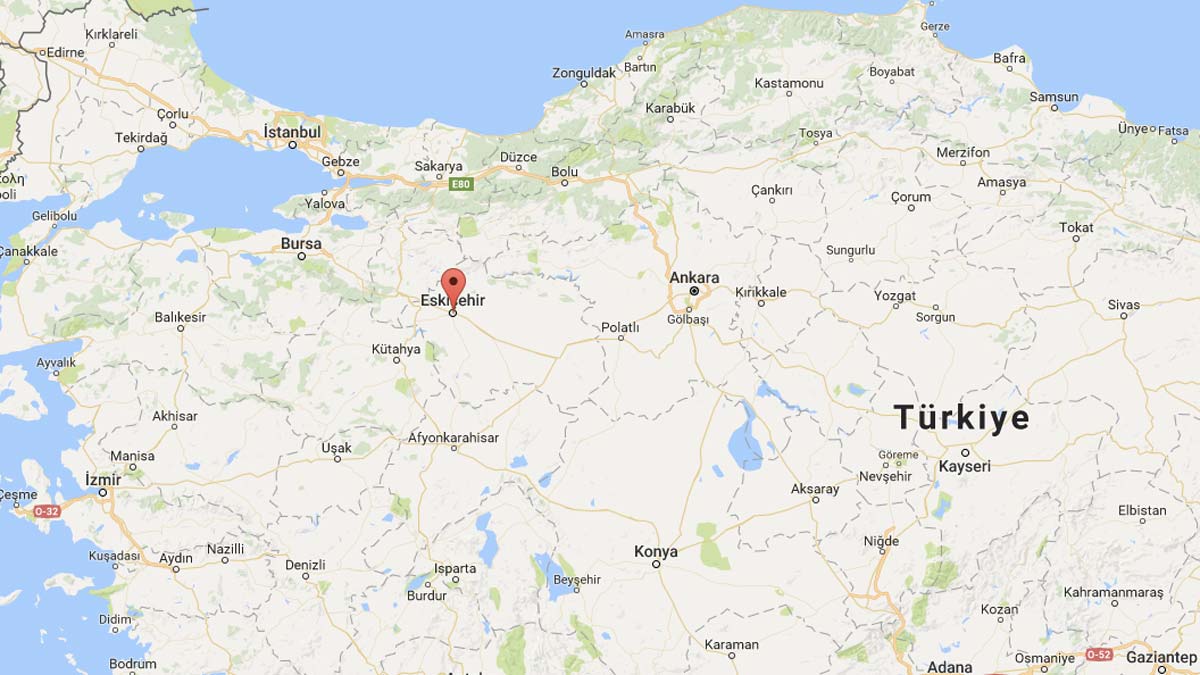Toydemir mountain during the Battle of Sakarya in August
1921.//

The disposition of Greek (blue) and Turkish (red) forces at
Toydemir during the Battle of Sakarya on 23 August 1921.
Below is the statement of Captain Tahsin, Commander of the
7th
Company of the 2nd Battalion of the 31st Regiment:
On the 29th of August I was taken prisoner by the Greek 28th
Regiment
of the 10th Division on the slopes of Toydemir mountain at
“Sakarya”.
Following a fierce attack
that continued for 3 days, our 8th Division,
which was on the left flank of the
Toydemir line was forced to retreat.
On
the fourth day the Greeks were able to take control of the entire line.
When I was seized by the attacking Greek soldiers they
threatened and
menaced me with mixed Turkish and Greek, together with hand
gestures,
indicating that they would kill me by bayonet. I hear filthy and vile
curses that should never be spoken. A
sergeant, who based on his accent
must have been a local Greek, spotted the
star and crescent symbol on my
cartridge belt and came after me cursing and
swearing – such that I’m
ashamed to write the words down – hitting me in the
chest with three rifle
butt blows. I
fell to the ground but just in time some Greek officers
arrived and rescued me,
with great difficulty, from the hands of this
murderous fiend.

The Sakarya River. The battle took place at the point of the
river between Eskişehir and Ankara.
They went through my pockets and took all my
personal and official
things. Then I was
sent to the rear with a sergeant and some soldiers,
who escorted me to the
observation hill for interrogation.
Just in back
of this hill a commander was surveilling. He was about 50-years-old but
fit. He demanded a translator and through the
translator, with a very
grim-looking face, he told me that if I didn’t give him
true and complete
information he would bayonet me right then and there. I said I would tell
him what I knew. He asked how many cannons, machine guns,
animal,
and men our division had, where the division had retreated to and the
level of defenses at the line of retreat.
With the necessary vagueness, I
gave him some incorrect and incomplete
information. The regimental
commander was so agitated that he was frothing at the mouth but the
translator told him that I had told him what
I knew.
The commander then ordered the
translator and guards, along with a first
lieutenant, to accompany me to the
division. They took me to İnler,
Katrancı, where they conducted a superficial interrogation. They then
made me walk until late at night to
the army headquarters, which was in
a tent southwest of the aforementioned village. The guards were
a tent southwest of the aforementioned village. The guards were
cavalrymen. During the night they loaded
their guns and tried to frighten
us with the sounds of the guns
mechanisms! In broken Turkish they said
to us “how do you dare to fire at our soldiers?
We will kill you rascals!”
Of
course, we said nothing in reply and continued on our way with our
hopes
crushed. We arrived toward morning but
since it was still dark,
they waited for the sun to rise two or three spear
lengths before
continuing.

Subsequently, they brought us, along
with some documents, to the chief-
of-staff’s tent. The chief-of-staff
was a rather young captain, who was
slim, sallow-skinned, beribboned and
chic. His first question was – via
the translator –
“With what mind and head are you fighting a war? You
seem to be dreaming that you can strike a
blow against the Greek army.”
At first,
I remained silent but he insisted I answer so I said “Does one
fight a war for
no reason?” He said in response that we
deserved to be
treated like a gang, rather than as soldiers, but since the
Greek
government is a just one we were considered prisoners of war. Then he
sent me back to my friends.
We were taken to a place where other officers, who had been taken
We were taken to a place where other officers, who had been taken
prisoner one or two days ago, were being held. They were: from the
15th Division – Major
Hasan Sabri, Captain Mehmed Şadi, First
Lieutenant Mehmed Tahir, Second
Lieutenant Celil; from the 57th
Division
– First Lieutenant Mehmed Lutfi, Second Lieutenant Kâmil,
Nuri, Officer
Candidate Bebaldin; from the 8th Division – Second
Lieutenant Mehmed.

The Turkish defensive line (red). Toydemir mountain is between
the two red battle markers on the left side of the horizontal red
line. The Kavuncu Bridge crosses the Sakarya River at the spot
across from where the red line changes to vertical.
On 2 September, together with these officers
and 500 soldiers, we were
marched in the burning summer sun to the Kavuncu
Bridge, in thirst and
disorder, with infrequent breaks. Because of our
weariness and thirst we
didn’t even have the strength to speak to one
another. We officers grit
our teeth and
were able to bear it, but the poor soldiers could not and
began screaming for
water because it was essentially an unbearable
situation. We were brought to a filthy, scummy, weak-flowing fountain
but the soldiers, dying of thirst, couldn’t resist attacking it.
The guards considered this
rush to be disorderliness and began hitting the
soldiers with their rifle butts
and an officer began slapping them with an
iron-tipped whip, with no
consideration for avoiding heads or eyes.
Three
of the soldiers fell to the ground. We thought they were dead but it seems
they
had passed out. A few soldiers were left
with them as the rest of us
continued on. We never found out what happened to
them.
Along the road they gave us bread
and cheese. We were told that we
would walk again from Kavuncu Bridge but there was a staff colonel
there, the chief
of provisions, and he deigned to come over to us and
inquire about our
situation. We pleaded for some conveyance, saying
that otherwise they might as well just kill us here. For whatever reason,
he agreed and put us
into an automobile for the journey. It
was a good
thing there was an automobile, because none of us had the strength
left
to walk.
Between the blazing sun
during the day, when we perspired heavily, and
then the nights, when we were
left without any covering out in the open,
the onset of illnesses would be the likely consequence. At the Biçer
station 40 of us were boarded onto a train wagon in order to go to
Eskişehir. The bottom of the wagon was filled up with broken equipment
parts so you can imagine how uncomfortable we
were. As soon as we got
out in Eskişehir
the Greek populace of men, women and children
surrounded us, shouting things like “why did you bring these scoundrals,
these murderers here alive? Why didn’t you kill these child-killers?” at
the
guards. Even from a distance, we could hear their
vengeful curses and
invective.

The POWs were taken from the Sakarya battlefield to Eskişehir
and from there overland to Bursa, then by sea from Mudanya,
Bursa's Sea of Marmara port, to Athens.

The POWs were taken from the Sakarya battlefield to Eskişehir
and from there overland to Bursa, then by sea from Mudanya,
Bursa's Sea of Marmara port, to Athens.
We stayed in Eskişehir for a full 10 days. Our food was obtained through
the chiefs of
the Moslem neighborhoods, either willingly or under
compulsion. They transported us via Bursa and Mudanya to
Athens.
Along the way they gave us bread
and sardines. In Athens, they
paraded us
through the center of the market to a place called the
prisoners supervision
office. Our names were confirmed and we were
given numbers. So we thought that our
degradation and oppression
was over, consoling each other with this idea. We imagined
that this
being the capital, they would give us good treatment but we
were in
for worse treatment than we experienced on the way here.
They stuffed us into a small house, with no
food and no one coming or
going. They
looted all the money in our pockets. Not
being robbed was
very rare. There was no
soap for us to wash our hands but there wasn’t
any water anyway. We lay on boards close together and the fleas
and lice
had their way with us. We were
given cheese and bread, but later not
even that.
The camp commander was a tall, fat reserve
captain. We appealed to him
in regard to
our hunger and destitution. This
captain discerned our
situation, took out 50 francs from his pocket and told us
to get something
for the evening for those with no money. He added that they would do
something for
tomorrow, too. So we bought some bread
and fresh grapes
with the money because there was nothing cheaper. We didn’t see the
captain again and our
misery continued.
//END of PART IX//

Hiç yorum yok:
Yorum Gönder